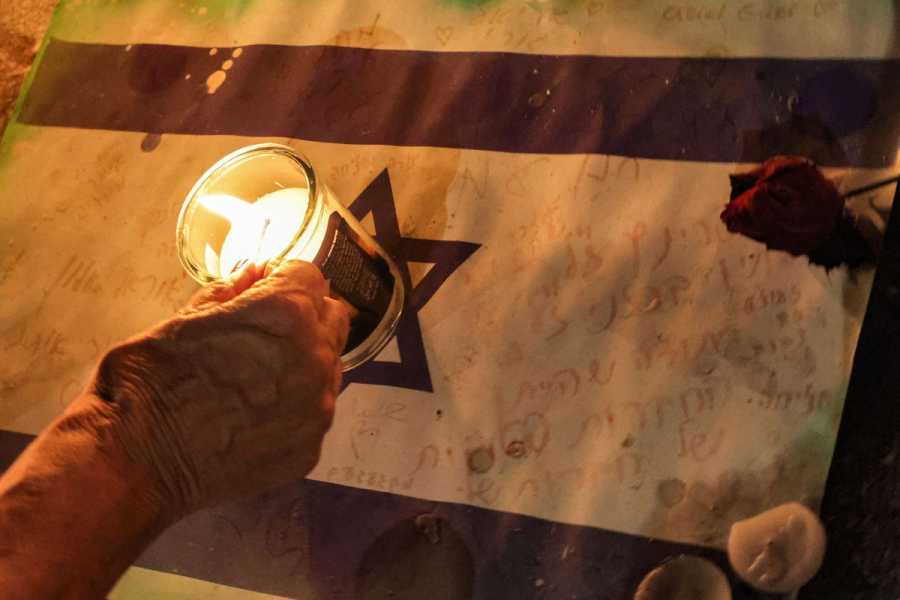How to understand Hamas’s alleged sexual attacks on October 7.

A woman lights a candle placed atop a sign showing an Israeli flag with hand-written notes. Jack Guez/AFP via Getty Images Ellen Ioanes covers breaking and general assignment news as the weekend reporter at Vox. She previously worked at Business Insider covering the military and global conflicts.
As Israeli officials piece together the attacks of October 7, evidence is mounting that Hamas committed crimes of sexual violence against the people it attacked in Israel — both women and men, both dead and alive.
UN testimony delivered earlier this month implicates Hamas and other militants in potential sexual crimes during the rampage in Israel, including shooting at the genitals of the victims, inserting foreign objects into sexual organs, as well as, potentially, rape and other forms of sexual violence. But as the testimonies shared before the UN indicate, investigations into what happened on that day are ongoing and will be complicated by the fact that many of the victims and witnesses are dead.
Sexual violence is horrific in any context, and is always connected to power and domination. But it takes on a different dimension when it is utilized as a tool of war — as it has been for centuries. And even though it is an unfortunately common feature of broader conflict, it’s often misunderstood and is difficult to prosecute — as all war crimes are — making justice for victims a complicated prospect at best.
In the case of the October 7 attacks, high-profile figures, like Sheryl Sandberg and Hillary Clinton, who has also firmly backed Israel’s war in Gaza, have called for more attention to be drawn to the allegations. There has been a fraught discourse over claims the allegations were insufficiently covered and ignored by the United Nations, followed by scrutiny of the motivations of those who are highlighting it and how this all plays into the world’s understanding of October 7 and Israel’s ensuing war in Gaza. It’s worth pointing out: Sexual violence in conflict is often under-covered relative to the gravity of the harms inflicted.
The United Nations and Israel are now seriously pursuing these allegations. The UN secretary-general on conflict-related sexual violence has requested access to information to investigate the assaults, and a UN Commission of Inquiry collecting evidence of war crimes — including sexual violence — committed by all sides in Israel and the occupied Palestinian territories since October 7 was established in the days following the attacks.
Testimony and evidence available so far indicates that some horrific forms of sexual violence did occur on October 7. (Hamas, for its part, has denied that its fighters would engage in that specific kind of brutality.) But it’s not yet clear how widespread that sexual violence was, and it may be unclear for many months to come, in part because Israel has been somewhat circumspect in releasing information, given the sensitive nature of the alleged crimes.
What is known is that violent conflict almost always includes sexual violence — in fact, as one expert Vox spoke to said, it is actually an inherent, if under-examined, aspect of conflict.
What we know about sexual violence on October 7
Israeli authorities have collected testimony from witnesses and first responders, as well as footage gathered from militants as they attacked towns and villages, as part of the Israeli government’s investigation into the sexual crimes that Hamas and other militants allegedly perpetrated. Evidence is still emerging and may be difficult to ascertain in full — gathering that evidence becomes forensically challenging as dead bodies decompose. And it may take time for survivors — including, potentially, hostages — to be able to recount their experiences and share them with the authorities, since sexual trauma often carries with it shame, doubt, and confusion.
Conflict-related sexual violence encompasses a broad and evolving set of crimes that don’t necessarily involve rape; sexually invasive searches, groping, stripping and public shaming, and damaging or maiming sexual organs are all forms of sexual violence, as is coercion into sexual acts to secure favorable treatment, shelter, food, or security in conflict or in captivity.
Following the October 7 attack in Israel, witnesses have presented testimony about nails and other objects being placed in the sexual organs of at least one victim, as well as evidence that militants shot at the sexual organs of victims. Israeli police have also collected witness testimony that indicates militants violently raped some of the victims, CNN reported earlier this month. However, the police do not have first-hand testimony from survivors, because it’s not clear there are any left. (Israel’s Prime Minister Benjamin Netanyahu, after meeting with released hostages, has said that Hamas and militants in Gaza are sexually assaulting female hostages.)
The investigation thus far has released limited information, with authorities navigating the tension between respecting the privacy of victims and ensuring the world knows about the violence.
“There’s an effort by the [Israeli] government … to not really reveal yet a lot of what happened for various reasons, both to protect the people who were released, and the people who are still captive, and maybe other reasons that we’re not aware,” Mairav Zonszein, senior Israel analyst with the International Crisis Group, told Vox. “So there’s a lot of fog around all of it.”
Putting the sexual violence of October 7 in context
Though sexual violence in conflict is not new, sexual violence at this scale in this particular conflict, at least by Palestinian actors, is, Zonszein said. (There is documented evidence of rape and sexual assault by Israeli troops against Palestinians during the Nakba, though since then, many scholars argue that sexual violence by Israel Defense Forces against Palestinians is rare during conflict. However, state-sponsored sexual violence against Palestinians does occur in other contexts, like in Israeli prisons and by Israeli settlers in the territories. As with all sexual violence, it’s difficult to evaluate how widespread these phenomena are due to limits in self-reporting.)
There could be many reasons for this; one is simply the unprecedented scale of Hamas’s attack, as well as the nature of it. Rather than the suicide bombings or rocket attacks Hamas has intermittently used against Israel over the last decade, Hamas and the Palestinian Islamic Jihad fighters who breached the Gaza border fence to attack Israeli towns and villages were face-to-face with their victims in ways Palestinian militants hadn’t been in previous conflicts — creating the opportunity to commit sexual violence.
Another possibility, if indeed the attacks were premeditated as Israeli officials have insisted, is that Hamas may have intentionally used the tactic as part of the group’s broader plan to provoke a massive reaction from Israel. If so, Jennie Burnet, director of the Institute for Women’s, Gender and Sexuality Studies at Georgia Southern University, said it’s worth asking if they picked up the tactic of using sexual violence from other extremist groups they are in contact with, such as the Islamic Revolutionary Guard Corps, which routinely uses sexual violence as a terror tactic against Iranians.
“It’s really important that it be investigated what precisely happened,” Burnet said. “Whether it was Hamas soldiers or militants taking their own initiatives, or whether it was planned and systematic, I think that is an important thing to uncover.”
Sexual violence is intrinsic to war throughout history
Sexual violence is extremely common throughout the history of conflict and conquest, though our understanding of what constitutes sexual violence within conflict is evolving. For example, the idea of enslaved people or concubines who were always at a ruler’s disposal for sex would have been thought of as slavery or membership in a royal court rather than as conflict-related sexual violence centuries ago. The taking of “brides” or sex slaves, as ISIS did to Yazidi women in Iraq as it captured land to build its caliphate, is now considered a clear-cut case of sexual violence.
UN peacekeepers in Haiti, insurgent groups like the Rapid Support Forces in Sudan, state actors like Japan’s use of Korean “comfort women,” and Russian forces raping Ukrainians are among the wide variety of perpetrators. Academic literature, especially that which centers on avenues for justice, often focuses on cases of systemic sexual violence — most often in the Rwandan genocide and in the Bosnian war, as the violence was so widespread, systemic, and ethnically motivated. These conflicts also led to the first international tribunals to include prosecutions for conflict-related sexual violence, and the documentation, study, and prosecution of these cases greatly advanced the study of conflict-related sexual violence.
“The prosecution of sexual violence by the [International Criminal Tribunal for Rwanda and the International Criminal Tribunal for the Former Yugoslavia] transformed scholarly studies of gender and war, as well as international human rights law,” Burnet said. Other instances, like the abuse of Korean women by Japanese soldiers and longstanding patterns of sexual violence by armed groups in the Democratic Republic of the Congo, remain under-studied.
But no matter who is perpetrating this violence or where it’s happening, it’s part of conflict because it serves a purpose — really, three purposes. First, experts say, it telegraphs to a community under siege that nowhere and no one is safe; second, it destabilizes the targeted society by fraying community and familial bonds, often by targeting women who often maintain those bonds; and third, it breaks the “gender contract” of a society, shattering the illusion that a society’s men can “protect” its women from violence.
“Sexual violence is very, very effective in destroying the women and girls of a particular community, but also the repercussions are massive, in terms of [disrupting] entire communities, entire families, entire communities, and entire nations,” said Joanna Bourke, a historian who has written extensively about sexual violence, war, and conflict.
This violence has devastating repercussions for women in terms of unintended pregnancies, disease, and injury to their sexual organs, Bourke said, but it also can create a cycle of harm, particularly for any children born from the sexual violence of the invading or adversarial forces. Significant evidence “shows that these children are highly abused, they have a real marginal existence within their communities, and have a disruptive presence within their communities, because they are constant reminders of the war, and what went wrong,” she told Vox.
This is not to say that men are never the victims of conflict-related sexual violence; they are, and likely far more often than is reported. There are more extreme examples, but one of the most jarring was the series of photos of detained Iraqi men coming from Abu Ghraib prison in 2004. American soldiers participated in and took photos of the men naked and piled on top of each other, and forced them to perform sexual acts, in a horrific pattern of sexual humiliation and abuse.
“Sexual violence [against] men in military conflicts has been kind of ignored, mainly because it doesn’t or doesn’t always … involve rape,” Bourke said. “But it does involve sexual humiliation, it does involve the crushing of testicles, it does involve all those sorts of things,” which researchers had previously classified as torture. “It turns out to be extremely high levels of sexual abuse against men in modern conflicts, but it simply was being categorized differently, because they were men and not women.”
Can victims of sexual violence in war find justice?
The Geneva Conventions, the post-World War II international agreements that form the basis for international humanitarian law (IHL), “require the parties to an armed conflict to protect women against rape, and to protect women and children from indecent assault,” Adil Haque, a professor at Rutgers Law School who specializes in the law of armed conflict, told Vox.
Though it is unlawful under the Geneva Conventions, sexual violence in conflict is difficult to prosecute in ordinary civilian courts, especially in places where gender inequality is pronounced and societal understanding of sex crimes is limited, as it was in Rwanda following the genocide of the Tutsi people by the Hutu militias. “In Rwanda before the genocide, there [was no] precise word for rape or sexual violence in the local language, Kinyarwanda, and most Rwandan traditions are around dealing with sexual impropriety,” Burnet said. “They didn’t address rape, they addressed inappropriate sexual relationships between men and women.” And although rape was against the law at the time of the genocide, “at the time rape was not clearly defined.”
However, in both Rwanda and Bosnia, “women survivors of sexual violence in the conflict … wanted legal recourse, and they wanted their perpetrators held to account before courts whenever possible,” Burnet told Vox. “And there’s documented cases in both countries of women going to great lengths and breaking lots of social taboos by giving testimony before courts about how they were violated, as part of that effort,” as well as, in Rwanda, demanding that the post-conflict national law categorize sexual violence among the most severe crimes of genocide.
Both Rwanda and Bosnia used their national courts to try (largely lower-level) perpetrators of conflict-related sexual violence. Under IHL, national courts are the right venue to try war crimes committed by regular troops, as long as they have the appropriate laws to prosecute conflict-related sexual violence. However, even with the right laws on the books, that doesn’t mean survivors get the justice they deserve; as of 2017, less than 1 percent of the estimated 20,000 Bosnians who suffered conflict-related sexual violence had their cases tried, according to Amnesty International.
Bosnia and Rwanda also set up special tribunals in cooperation with the United Nations, which were intended to go after those in power who directed or facilitated sexual violence in those conflicts, as well as other war crimes and crimes against humanity. Though the international tribunal courts arguably did not go far enough in providing reparations and support for victims of sexual violence, they were the first international criminal tribunals to bring charges pertaining to conflict-related sexual violence.
But many people who have suffered the life-long consequences of conflict-related sexual violence never find a measure of justice, whether that’s in court or a formal apology. Over the decades, disagreements over how to recognize, characterize, and provide reparations for “comfort women,” the Korean women and children who were used as sex slaves for Japanese soldiers during that country’s occupation of the Korean Peninsula, have greatly contributed to the strained relations between the two countries. Despite a 2015 agreement and apology from Japan, it remains contentious; over the past decade, the issue has been litigated in South Korean courts, with Japan denying that the victims were forcibly taken from their homes and objecting to the use of “sexual slavery” to describe the events.
In the context of October 7, Israel has already indicated that it is taking claims of sexual violence seriously, as has the International Criminal Court (ICC).
“Importantly, rape is a war crime under the ICC Statute … as well as a crime against humanity if committed as part of a widespread or systematic attack on a civilian population,” Haque said. “The ICC prosecutor, from his very first public statements about the conflict, alluded to clear evidence of sexual violence, and has repeatedly identified rape as one of the war crimes that his office is investigating.”
Though the ICC and Israeli police are investigating the reports of sexual violence during Hamas’s attack, Israel is not cooperating with the UN Commission of Inquiry due to perceived anti-Israel bias, which could greatly impede the investigation into war crimes that the commission is mandated to perform. Israel has invited the special representative of the secretary-general on sexual violence in conflict, Pramila Patten, on an official visit to the country, but Israel hasn’t invited the UN agencies with a mandate to investigate the allegations to do so yet. Israel’s investigation into the reports of sexual violence indicates a willingness to try the perpetrators in court, and the ICC could potentially have jurisdiction over some crimes that occurred on October 7, even though Israel is not party to the ICC.
Regardless of how these investigations play out, justice for victims of conflict-related sexual violence is not guaranteed, despite forward steps in its study, understanding, and prosecution.
Sourse: vox.com






